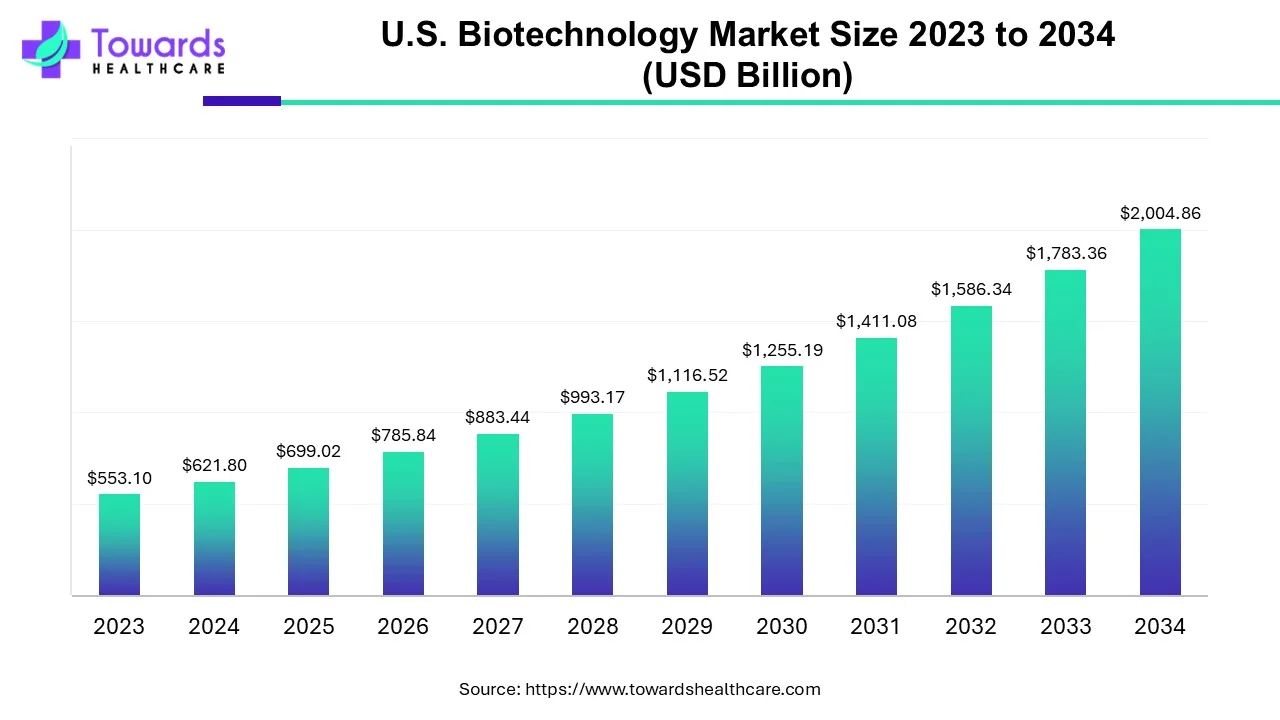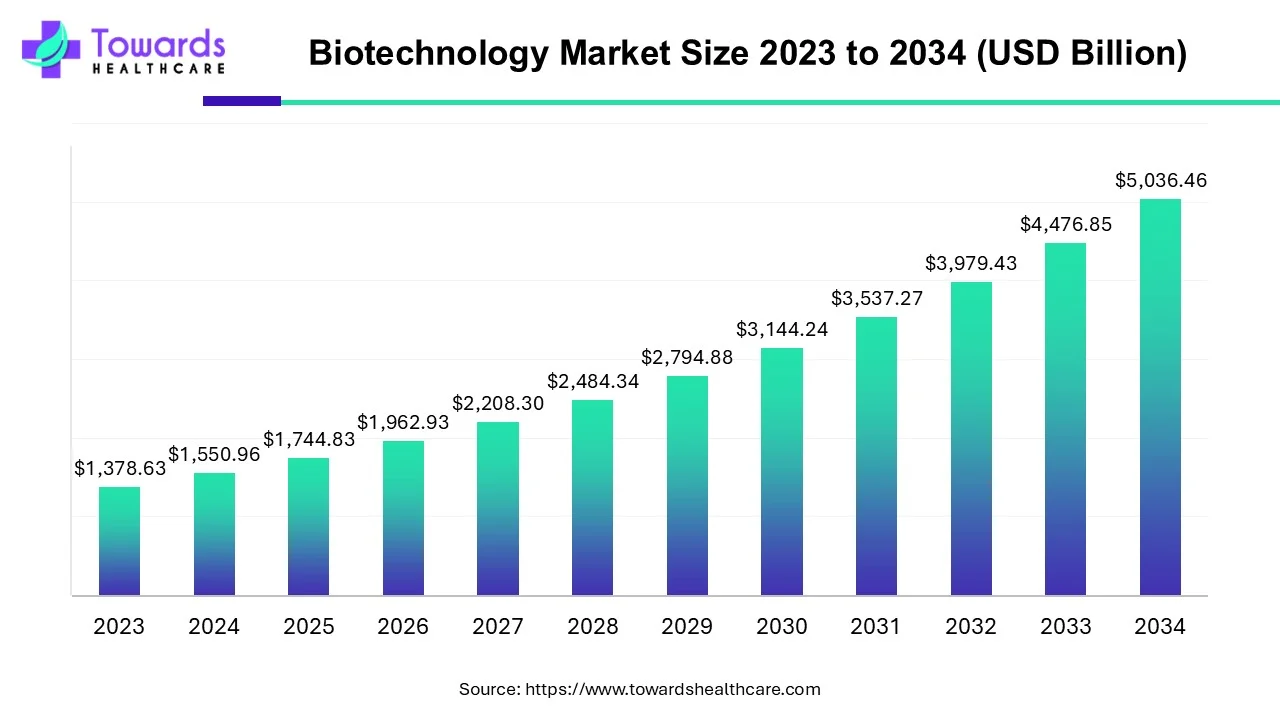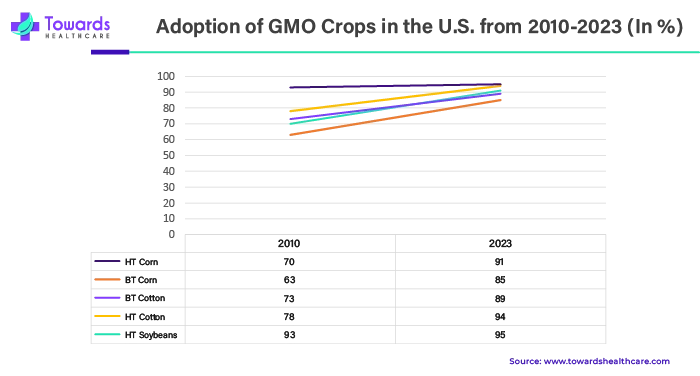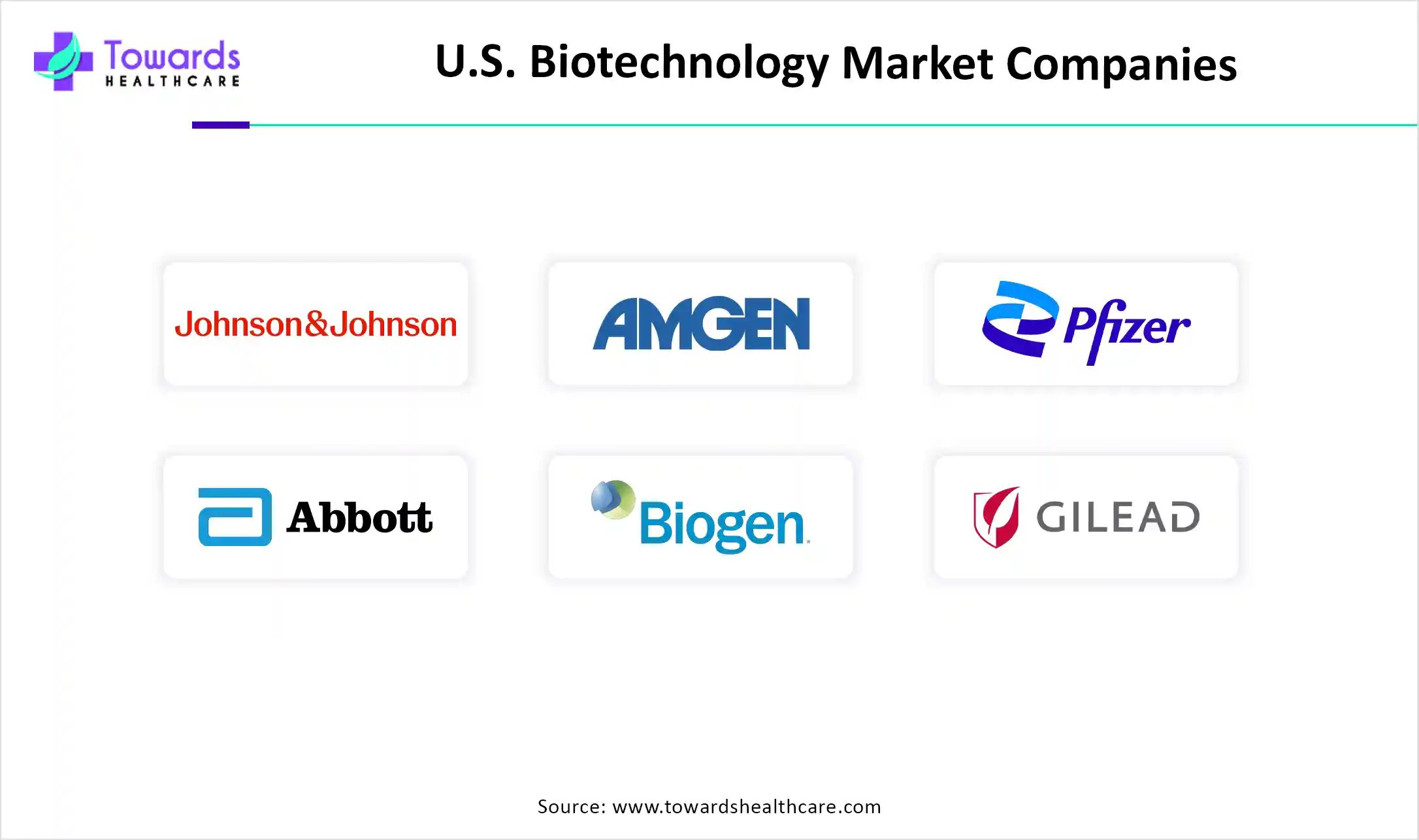February 2026

The U.S. biotechnology market is projected to reach USD 2004.86 billion by 2034, growing from USD 699.02 billion in 2025, at a CAGR of 12.42% during the forecast period from 2025 to 2034.

The U.S. biotechnology market is rapidly growing due to the continuous demand from various industries, including healthcare, food & beverages, agriculture, pharmaceutical, fermentation, natural resources & environment, biofuels and so on. Many useful items have been developed as a result of the wide range of uses of biotechnology. Biotechnology is the use of biology to the creation of novel goods, processes, and living things with the goal of enhancing society and human health. Innovations in modern biotechnology are enabling us to fight uncommon and crippling diseases, lessen our impact on the environment, feed the needy, use cleaner and less energy, and improve the safety, efficiency, and cleanliness of industrial production processes. The U.S. biotechnology market is developing fast and has enormous potential to address major global issues and raise people's standard of living everywhere.
The biotechnology market is projected to grow from USD 1,744.83 billion in 2025 to USD 5,036.46 billion by 2034, reflecting a robust CAGR of 12.5% during the forecast period. This significant expansion is driven by continuous innovation and rapid technological advancements across the biotechnology sector.

Biotechnology has applications in various industries, such as agriculture, pharmaceuticals, environmental conservation, food production, and energy. In agriculture, biotechnology is used to develop genetically modified crops with higher yields and resistance to pests and diseases. In the pharmaceutical industry, biotechnology plays a crucial role in the development of new drugs, personalized medicine, and gene therapy. Environmental biotechnology is focused on waste management, pollution control, and the development of renewable energy sources. Additionally, biotechnology is utilized in the production of biofuels, bio-based materials, and bio-based chemicals, contributing to the energy industry. In the food industry, biotechnology is employed for food processing, quality improvement, and the development of genetically modified organisms with enhanced nutritional value. These applications demonstrate the diverse and far-reaching impact of biotechnology across multiple industries, highlighting its importance in addressing global challenges and improving our quality of life.

There are several ethical concerns associated with biotechnology that prevent the growth of the U.S. biotechnology market. A number of ethical considerations apply to biotechnology, including those of justice and human dignity, science and technology ethics, medical ethics, and more. Diverse cultural perspectives and values exist. Their enduring notion is reflected in these values. Biotechnology may occasionally undermine these cultural ideas; thus, this is something to be cautious about. One of the most difficult problems is modifying the genes of different crops to create hybrids. The fact that biotechnology offends people's religious sensibilities is one of the main problems it encounters. Developmentally speaking, bioethics in biotechnology has always been challenging. However, upholding moral integrity is also a crucial responsibility for a developer or scientist.
Concern over converting biomass to biofuel is growing again as a result of rising energy costs and running out of fossil resources. Biofuels that come from sustainable feedstocks can be used to fulfill almost 25% of global transportation fuel demand by 2050. They are also considered ecologically benign fuels. In addition, it is anticipated that biofuels would lessen dependency on foreign oil, cut greenhouse gas emissions, and boost local economies by boosting the demand and cost of bioproducts and generating jobs. Due to their notable qualities, which include their low sulfur content, higher cetane number, higher flash point, improved ignition property, and overall lower emission of CO2 and other toxic pollutants, biofuels have recently attracted a lot of attention as potential replacements for fossil fuels. They can be used directly or blended with fossil fuels in different ratios.
For instance,
By technology, the DNA sequencing segment dominated the U.S. biotechnology market in 2023. DNA sequencing is essential in many fields, including medicine, where it is used for epidemiological research, illness diagnosis, and therapy. Sequencing has the power to fundamentally alter the fields of public health, plant, animal, and food safety, as well as sustainable agriculture. It facilitates the improvement of agriculture by means of efficient breeding of plants and animals, which in turn reduces the likelihood of disease outbreaks.
Furthermore, DNA sequencing can potentially protect and improve human and wildlife habitats. DNA sequencing plays a crucial role in genomics research by helping us interpret an organism's full genomic sequence, which advances our knowledge of the organism's genomic structure and composition. The diagnosis and treatment of illness are important uses for DNA sequencing. It is an invaluable instrument for the diagnosis of hereditary disorders, the detection of microbial infections, and the identification of tumorigenic gene alterations, among other applications that support the development of customized medicine.
For instance,
By technology, the nanobiotechnology segment is estimated to grow at the fastest rate during the forecast period. Nanobiotechnology has recently emerged in the U.S. biotechnology market. Creating and modifying materials at the nanoscale is the focus of nanotechnology. With fast-expanding commercial uses, this is a relatively new field of study for researchers. Biotechnology on a nanoscale is known as nanobiotechnology, and it has many fascinating uses in regenerative medicine, medication delivery, and diagnostic medical testing.
By application, the health segment dominated the U.S. biotechnology market and is expected to remain dominant throughout the forecast period. The healthcare business has seen a notable impact from biotechnology in recent times, leading to modifications in the approaches for disease diagnosis, treatment, and prevention. Innovative drugs, vaccines, diagnostic tools, and other healthcare products that are transforming human health are being developed by biotech companies and researchers utilizing the latest advancements in molecular biology, genetics, and nanotechnology. This has made it feasible to develop new treatment options for diseases like cancer and other hereditary issues. Biotechnology has also enabled the detection and treatment of infectious diseases such as HIV infection through the creation of innovative antiretroviral drugs and diagnostic tools.
For instance,
By application, the bioinformatics segment is estimated to grow at the fastest CAGR during the forecast period. Through the creation of software and algorithms, bioinformatics is primarily used to extract knowledge from biological data. Gene and proteome analysis, image analysis, drug discovery, and many more fields are among the many areas in which bioinformatics is actively used. Developing strategies to avoid, manage, and treat dangerous infectious illnesses is the primary goal of precision and preventive medicine, two domains where bioinformatics plays a major role. The primary goal of bioinformatics is to improve our comprehension of biological mechanisms.
For instance,

| Company Name | Pfizer |
| Headquarters | New York, United States |
| Pipeline | In February 2024, Pfizer announced that it is turning to target cancer more closely, putting a special emphasis on small compounds, bispecific antibodies, and next-generation antibody-drug conjugates (ADCs). This change in approach comes after Seagen, a biotech company creating ADCs for cancer treatment, was acquired last year. With the $43 billion transaction, Pfizer now has 60 cancer initiatives, quadrupling its previous level. Big Pharma is now promoting a pipeline that claims to have the potential to produce at least eight blockbuster drugs by 2030 during an innovation day on Thursday. |
| Company Name | Johnson & Johnson Services Inc. |
| Headquarters | New Jersey, United States |
| Pipeline | In May 2024, Proteologix Inc., a privately owned biotechnology firm focused on bispecific antibodies for immune-mediated disorders, and Johnson & Johnson reached a formal deal to acquire the former for $850 million in cash with the possibility of an additional milestone payment. Two bispecific antibodies, PX130, which targets IL-13 plus TSLP and is ready to enter phase 1 development for moderate to severe asthma and atopic dermatitis (AD), are in Proteologix's portfolio. |
By Technology
By Application
February 2026
February 2026
January 2026
January 2026